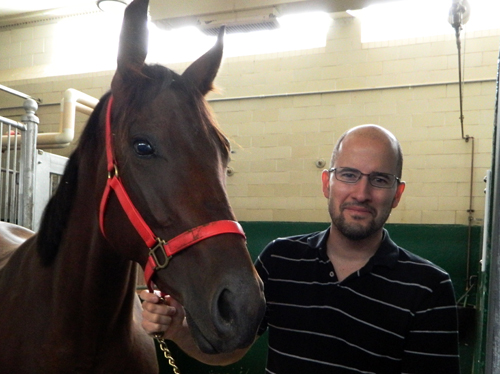
Antibiotics, as we know, can help kill the bacteria that make us sick. But many people may not realize that these medications can also destroy some of the bacteria in our bodies that help keep us healthy.
Working with pathobiology professor Scott Weese, PhD student Marcio Costa has been conducting research on the importance of a healthy bacterial balance in horses – and his results are likely to apply to other species as well. Costa uses DNA sequencing techniques to identify the bacteria in the intestines of horses and examines how they change under various conditions.
His first step was to establish the normal equine bacteria. He studied healthy adult horses from several farms, all kept on pasture, and discovered that the intestinal bacteria were very similar from one horse to the next, even though there was some geographical distance between them. “Many of the bacteria we found had not been previously identified,” Costa says.
“The only two horses that were different were the two OVC teaching horses we included in the study,” he adds. “They were similar to each other but very different from the rest. This may be because they were kept in stalls much of the time. It certainly shows the importance of the environment in determining the intestinal bacteria.”
With that clarified, Costa’s next step was to compare the gut bacteria in healthy horses with the bacteria in horses with colitis. The illness causes diarrhea that is often fatal in horses, and in most cases no pathogen can be identified.
As he expected, Costa found that the types of bacteria in the intestines of horses with colitis were very different from the healthy horses. “This is the first step in developing a new approach to treat colitis,” he says. In humans and in dogs, fecal transplants are being used to treat similar conditions, resulting in a very high success rate. Costa suspects this treatment may work for horses as well.
Since colitis has been linked to the use of antibiotics, Costa’s next project took a group of healthy horses and divided them into four sub-groups. One was a control group that received no antibiotics; the other three each received different antibiotics. Within five days, the gut bacteria in the antibiotics groups had changed dramatically.
“How they changed depended on the drug they were given,” adds Costa. “The horses given penicillin, for example, were different in one way, and the horses given oral sulfa drugs changed in another way.” Even after 30 days of follow-up, the horses had not yet completely recovered from the effects of the antibiotics.
Costa also wanted to look at how the normal patterns of bacteria in the horse’s system develop, so he began following a group of foals from birth to nine months. “In humans, newborn babies have very different bacteria,” he says. “That changes once they start on other foods.”
He also hoped to investigate the “foal heat diarrhea” phenomenon seen in foals. This period of diarrhea starts at around seven to 10 days after the foal is born and typically coincides with the mother’s first heat. Could this be related to some change in the intestinal bacteria?
Not according to Costa’s research. “Our results are still preliminary, and we are working on a broader study, but we found that the foal was colonized with certain bacteria at birth or soon after, and those stayed consistent for a long period of time – as long as the foal was getting milk from his mother.” Even when these young horses went through the foal heat diarrhea, the bacteria did not change much.
The bacteria were quite different, though, from the bacteria of adult horses on the same farm. In fact, about 20 per cent of the bacteria seen in the foals were unknown.
Costa points out that some veterinarians routinely give antibiotics to newborn foals to prevent illness. “I think my research suggests we need to be more conservative in our use of antibiotics. These antibiotics would be changing the intestinal bacteria in the foal, and we don’t know what the consequences would be.”
This fall, Costa will return to his native Brazil with his wife and three children to expand his research to include other animals. He’ll be examining the health consequences of giving antibiotics to food animals, including feedlot cattle, swine and poultry. “It’s a big project,” he acknowledges, “but I think it is a very important issue.”